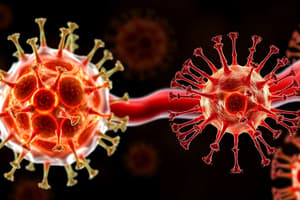Podcast
Questions and Answers
Which statement most accurately describes the primary function of the innate immune system?
Which statement most accurately describes the primary function of the innate immune system?
What role do cytokines play in the immune system?
What role do cytokines play in the immune system?
Which component does NOT belong to the innate immune response?
Which component does NOT belong to the innate immune response?
How do humoral and cellular immune responses differ?
How do humoral and cellular immune responses differ?
Signup and view all the answers
What is the effect of the complement system when activated?
What is the effect of the complement system when activated?
Signup and view all the answers
Why is immunological memory important for the adaptive immune system?
Why is immunological memory important for the adaptive immune system?
Signup and view all the answers
Which of the following correctly describes defensins?
Which of the following correctly describes defensins?
Signup and view all the answers
Which of the following correctly describes the relationship between innate and adaptive immunity?
Which of the following correctly describes the relationship between innate and adaptive immunity?
Signup and view all the answers
Study Notes
Innate Immunity
- The body's first line of defense against pathogens
- Includes physical barriers (skin, mucous membranes)
- Employ antimicrobial chemicals (e.g., hydrochloric acid, lysozyme)
- Involves immune system cells that attack pathogens
- Includes complement system (proteins that kill bacteria)
- Also includes defensins (antimicrobial peptides)
Adaptive Immunity
- Second line of defense, slower but highly specific
- Responds to specific pathogens (antigens)
- Involves B and T lymphocytes and antigen-presenting cells
- Creates immunological memory for faster responses to subsequent exposures
- Operates through humoral and cellular immune responses
- Depends on innate immunity for initiating responses
Cytokines
- Low molecular weight proteins
- Act as chemical messengers between immune cells
- Regulate innate and adaptive immune responses
- Secreted by cells involved in both innate and adaptive immunity
- Activated when an antigen is present
Studying That Suits You
Use AI to generate personalized quizzes and flashcards to suit your learning preferences.
Description
Test your knowledge on the key features of innate and adaptive immunity. This quiz covers the body's lines of defense against pathogens, the roles of immune system cells, and the function of cytokines. Delve into the crucial components that shape our immune responses.




